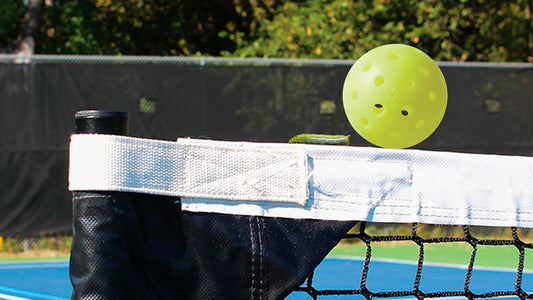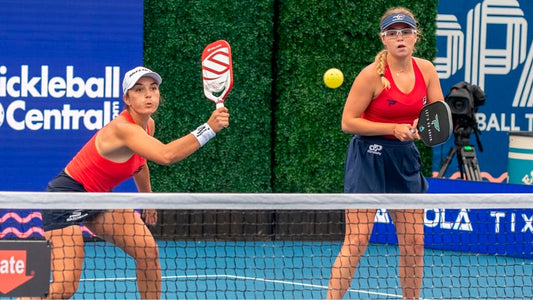
When Weather Interrupts a Pickleball Game
Share
“You can't stop the waves, but you can learn to surf.” – Jon Kabat-Zinn
Pickleball, like any outdoor sport, is subject to the whims of weather. While a sunny day with a gentle breeze is ideal for a match, the reality is that weather can change rapidly, leading to interruptions or even the cancellation of games. Understanding how to handle these situations is essential for both players and organizers. Here’s what you need to know about what happens when weather interrupts or stops a pickleball game.
1. Common Weather Interruptions
Weather interruptions can come in various forms, each impacting the game differently. It’s important to recognize the specific challenges that different weather conditions present and to know when it’s best to pause or stop play entirely to ensure the safety and enjoyment of all players.
- Rain: Light rain might not stop a game, but as the court becomes slippery, it poses a safety hazard. Most games are paused or postponed when rain starts, especially if it becomes heavy.
- Wind: Strong winds can drastically affect the flight of the ball, making the game difficult and unpredictable. While some play may continue, if the wind is too strong, it may lead to a suspension of the game.
- Thunderstorms: Lightning and thunderstorms are serious safety concerns. Games are immediately halted if lightning is spotted or thunder is heard, and players are advised to seek shelter.
- Extreme Heat or Cold: Extreme temperatures can also lead to game interruptions. In cases of excessive heat, players are at risk of heat exhaustion or heatstroke, and games may be paused to ensure player safety. Similarly, in extreme cold, games may be postponed to prevent injuries related to cold exposure.
2. What Happens When a Game is Interrupted?
When a pickleball game is interrupted due to weather, there are a few possible outcomes depending on the severity of the weather and the duration of the interruption. Understanding these scenarios helps players and organizers make informed decisions about whether to resume play or call it a day.
- Temporary Pause: In many cases, the game is temporarily paused. Players are asked to leave the court and wait for the weather to improve. If conditions clear up within a reasonable time frame, the game can resume from where it left off.
- Suspension and Rescheduling: If the weather is unlikely to improve quickly, the game may be suspended and rescheduled for a later time. This is common in organized tournaments or league play where a schedule must be maintained.
- Game Cancellation: In some cases, especially during recreational play, the game may be canceled altogether if the weather conditions do not improve. Players may choose to reschedule the match on their own or simply move on to the next scheduled game day.
3. Resuming Play After an Interruption
Resuming play after a weather interruption involves more than just returning to the court. It requires ensuring that the playing conditions are safe and that all players are ready to continue. This section provides guidance on what steps should be taken before the game restarts.
- Score and Serve: The score should remain as it was when the game was paused. The team that was serving at the time of interruption should continue serving when the game resumes.
- Court Conditions: Before resuming play, it’s crucial to ensure the court is safe. For example, if the rain has stopped, the court should be dried and inspected for slippery spots.
- Player Readiness: Players should take a few minutes to warm up again, especially if the pause was lengthy. This helps prevent injuries and gets everyone back into the rhythm of the game.
4. Handling Weather Interruptions in Tournaments
In tournaments, the stakes are higher, and managing weather interruptions becomes more complex. Organizers must consider the fairness of the competition, the safety of participants, and the overall schedule. Players should be familiar with the tournament’s procedures for weather delays to avoid confusion and ensure a smooth continuation of the event.
- Communication: Tournament organizers usually communicate with players through official channels, such as announcements, apps, or emails, to keep everyone informed about delays, resumptions, or cancellations.
- Fairness and Safety: The primary concerns during weather interruptions are player safety and maintaining the integrity of the competition. Decisions about resuming play, rescheduling matches, or altering the format are made with these priorities in mind.
- Expect Delays: Players should be prepared for potential delays and rescheduling, especially in outdoor tournaments. It’s a good idea to bring additional gear, such as extra clothing or snacks, to stay comfortable during unexpected pauses.
Game Point
Weather interruptions are an inevitable part of playing outdoor pickleball, but knowing how to handle them can keep the experience enjoyable and safe. Whether it’s a light drizzle or a full-blown storm, being prepared and understanding the protocols for game interruptions ensures that you can get back to playing as soon as possible—or reschedule without stress.
Remember, the safety of all players is the top priority, so when in doubt, it’s always better to pause and play another day.
See you on the courts!



